Abstract
Five college students talked to an experimenter about various topics. Time spent looking at the experimenter was reinforced by verbal statements of praise and interest on five variable-interval schedules. Herrnstein's hyperbola provided a good description of the time-allocation data for 4 of the 5 subjects, and accounted for 95% of the variance of the median time-allocation data. The hyperbola provided a significantly better description of the data than a two-parameter ramp function with similar differential properties. Estimates of the asymptote, k, of the hyperbola varied among subjects from about 2 to about 15 seconds of eye contact per minute. These estimates were much smaller than the constant 60 seconds of eye contact per minute required by Herrnstein's matching theory. These results support the conclusion that Herrnstein's hyperbola describes naturalistic human behavior maintained by naturalistic social reinforcement as well as it describes the behavior of humans and nonhumans in typical laboratory preparations. The results also indicate that the hyperbolic form of the time-allocation version of Herrnstein's equation is accurate, but that the constant k requirement of matching theory may not hold.
Keywords: matching law, Herrnstein's hyperbola, time allocation, social behavior, social reinforcement, eye contact, praise, humans
Full text
PDF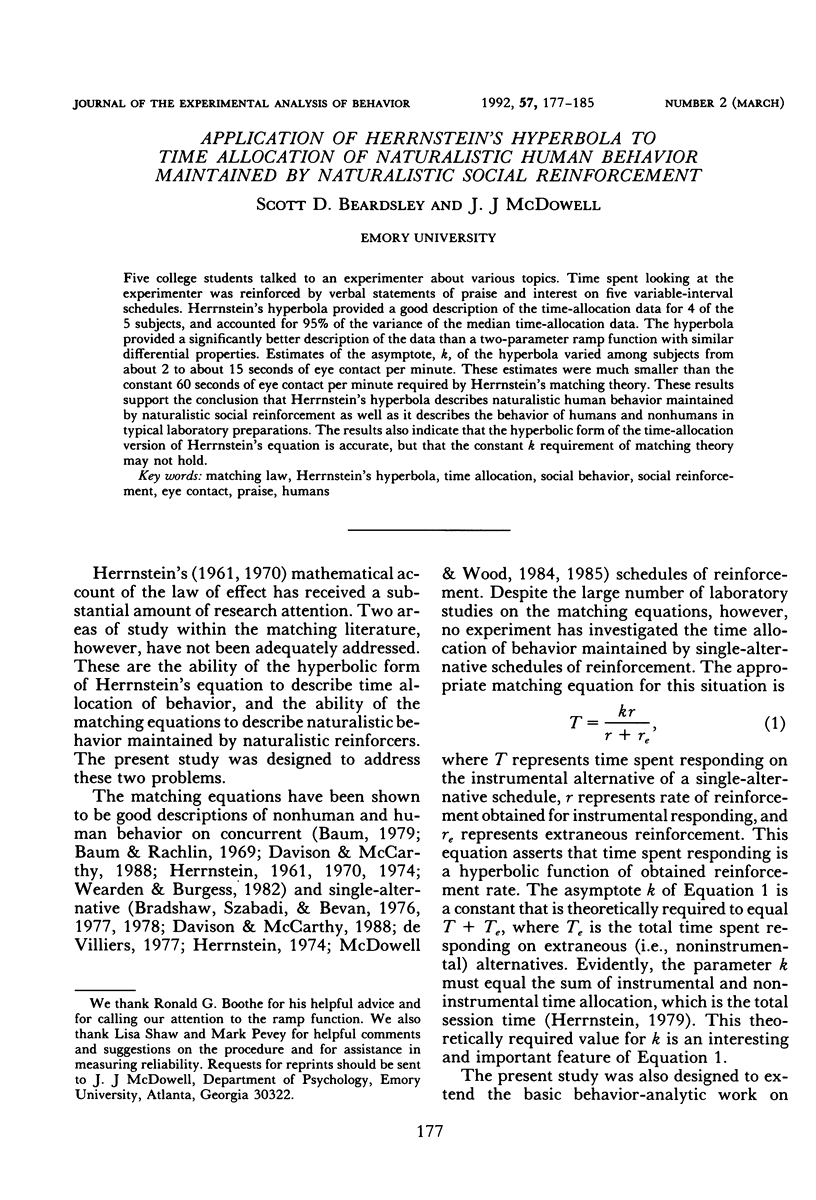
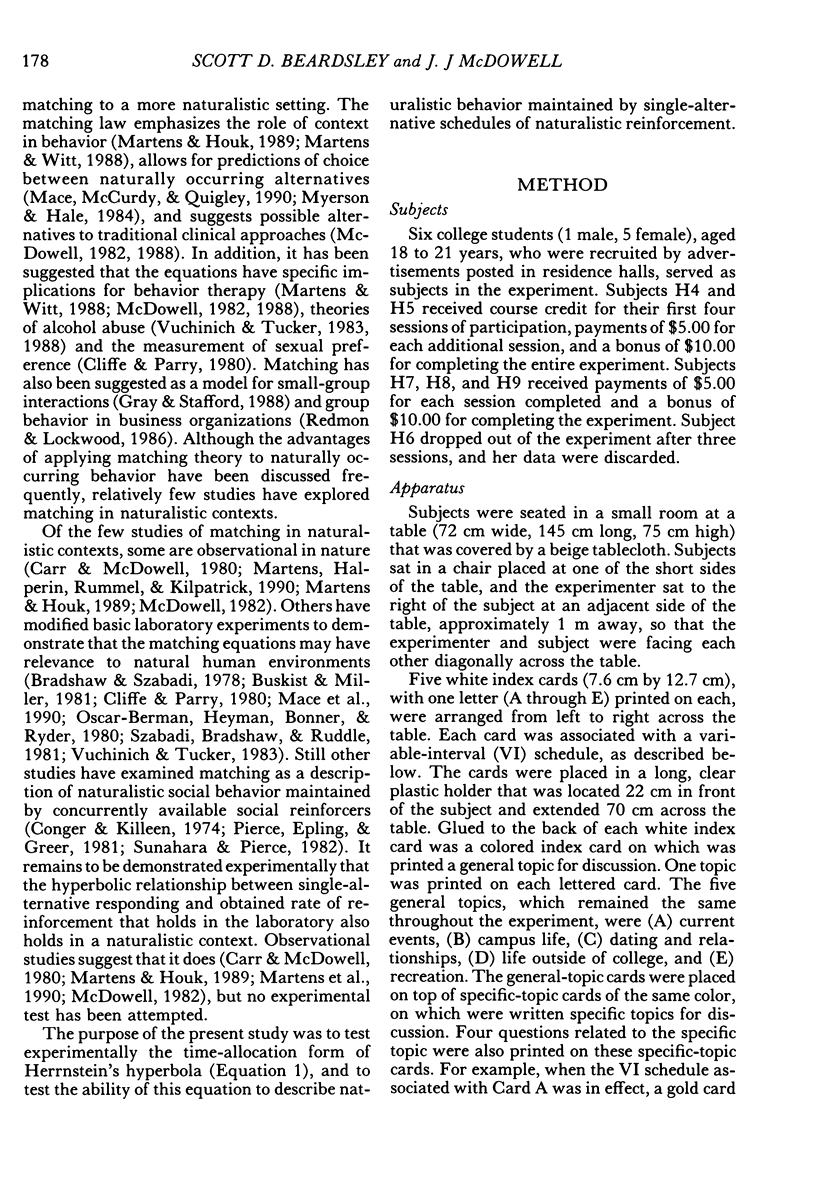
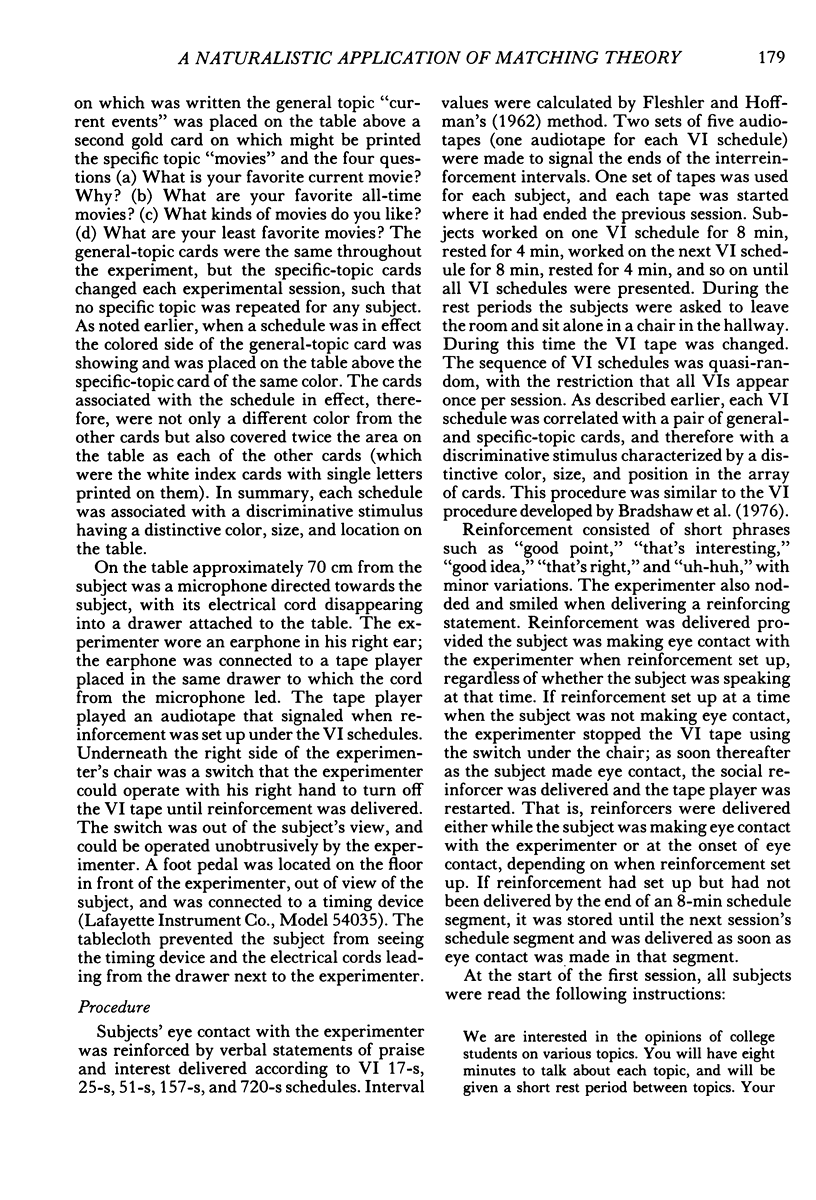
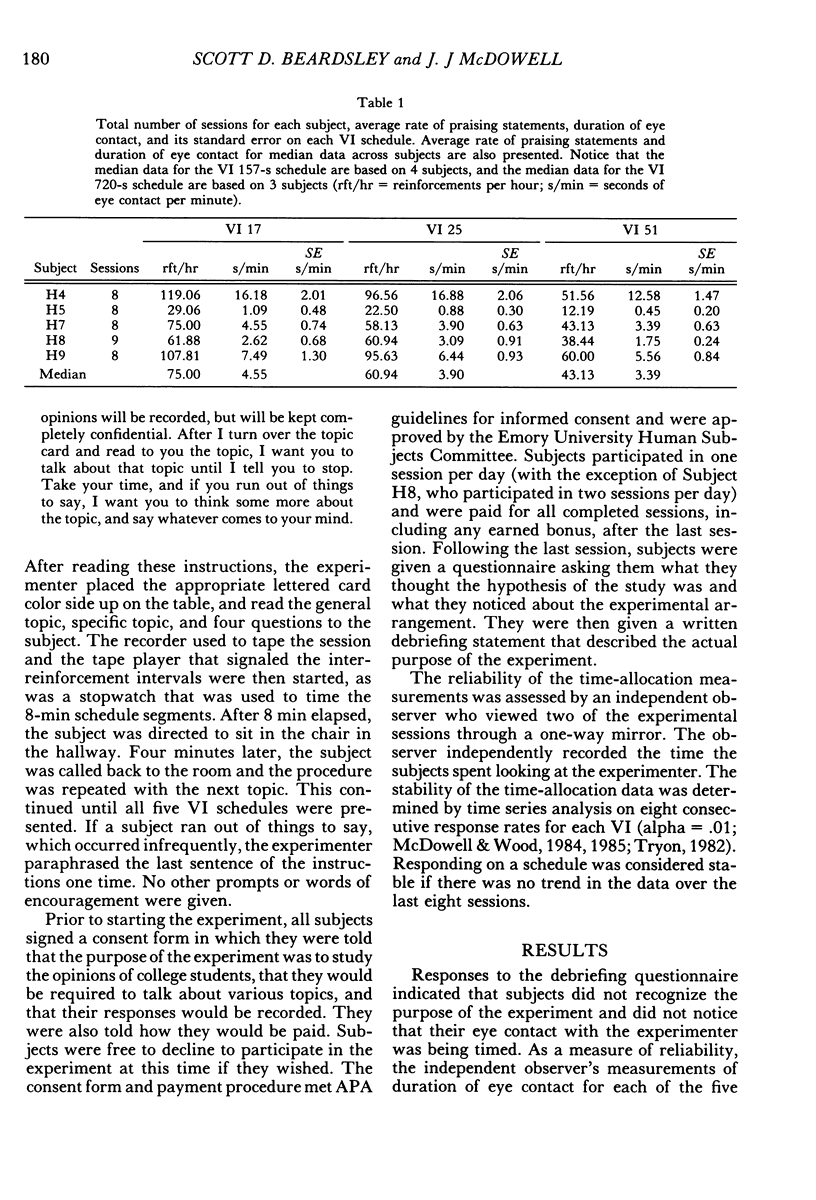
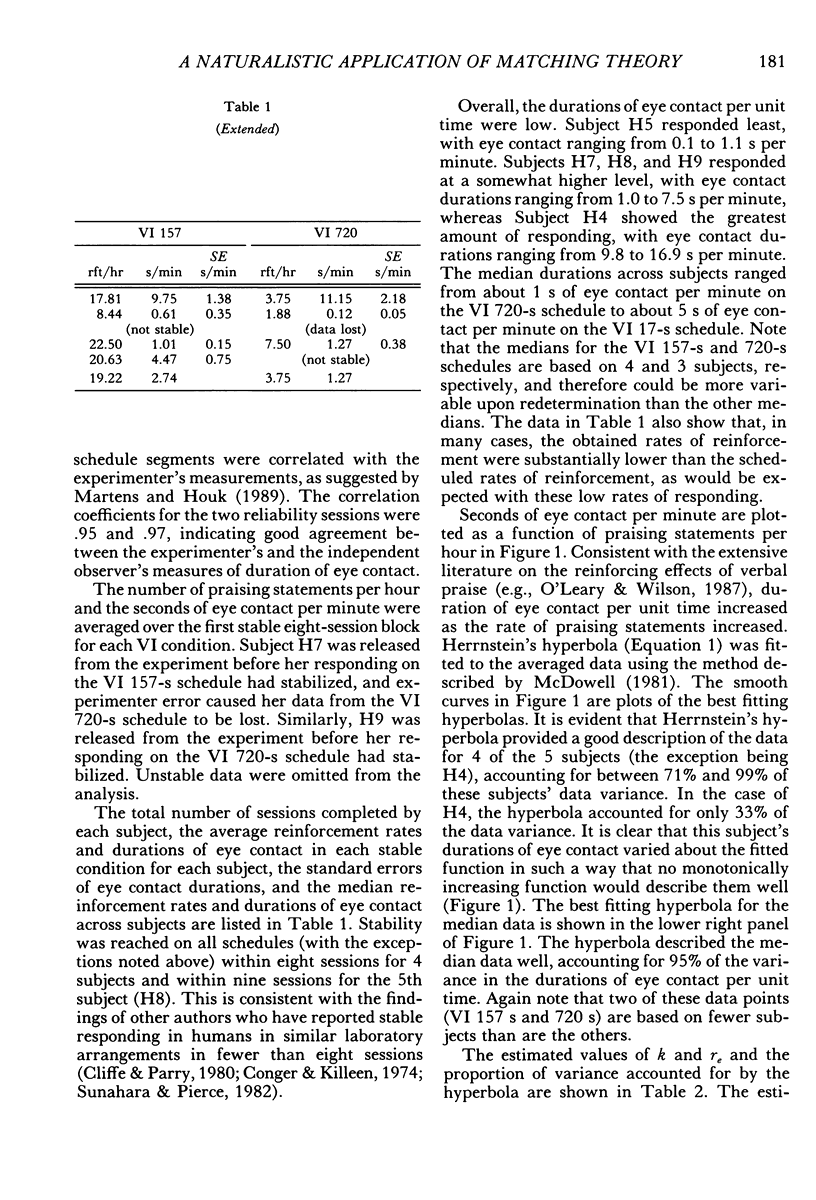
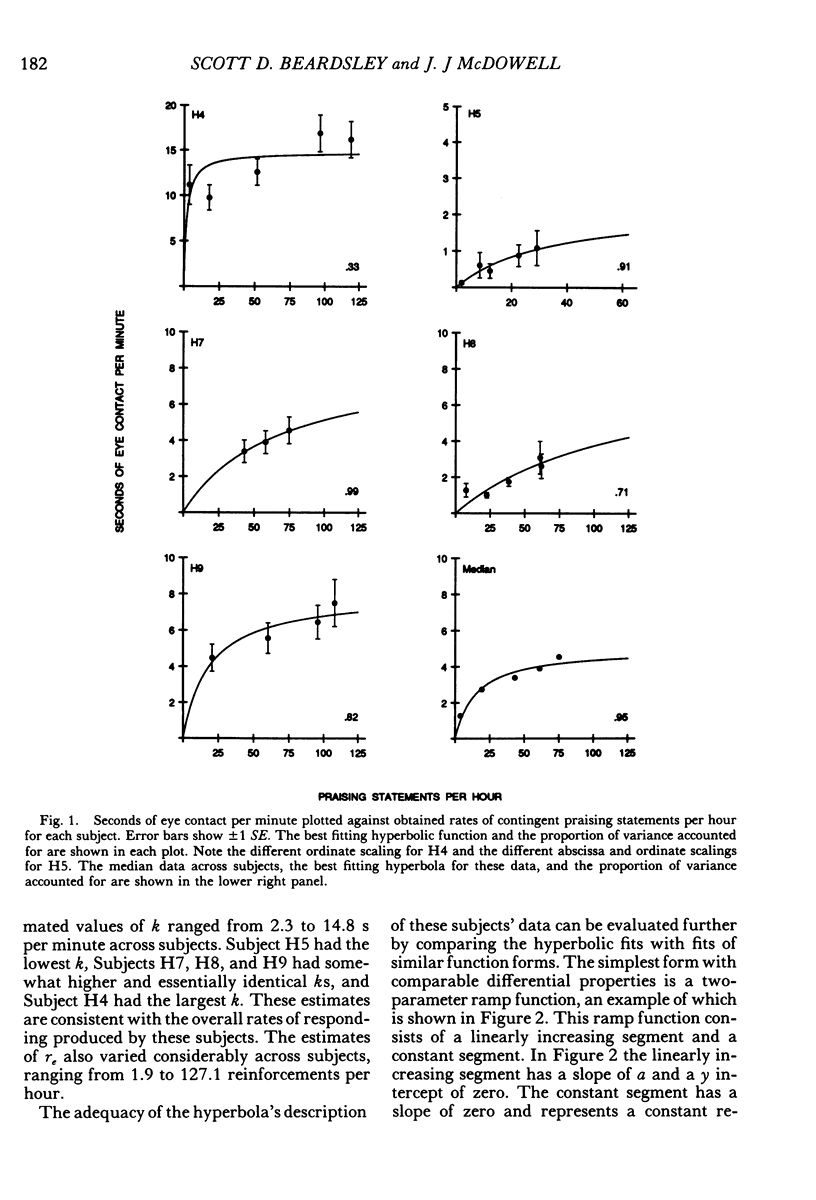
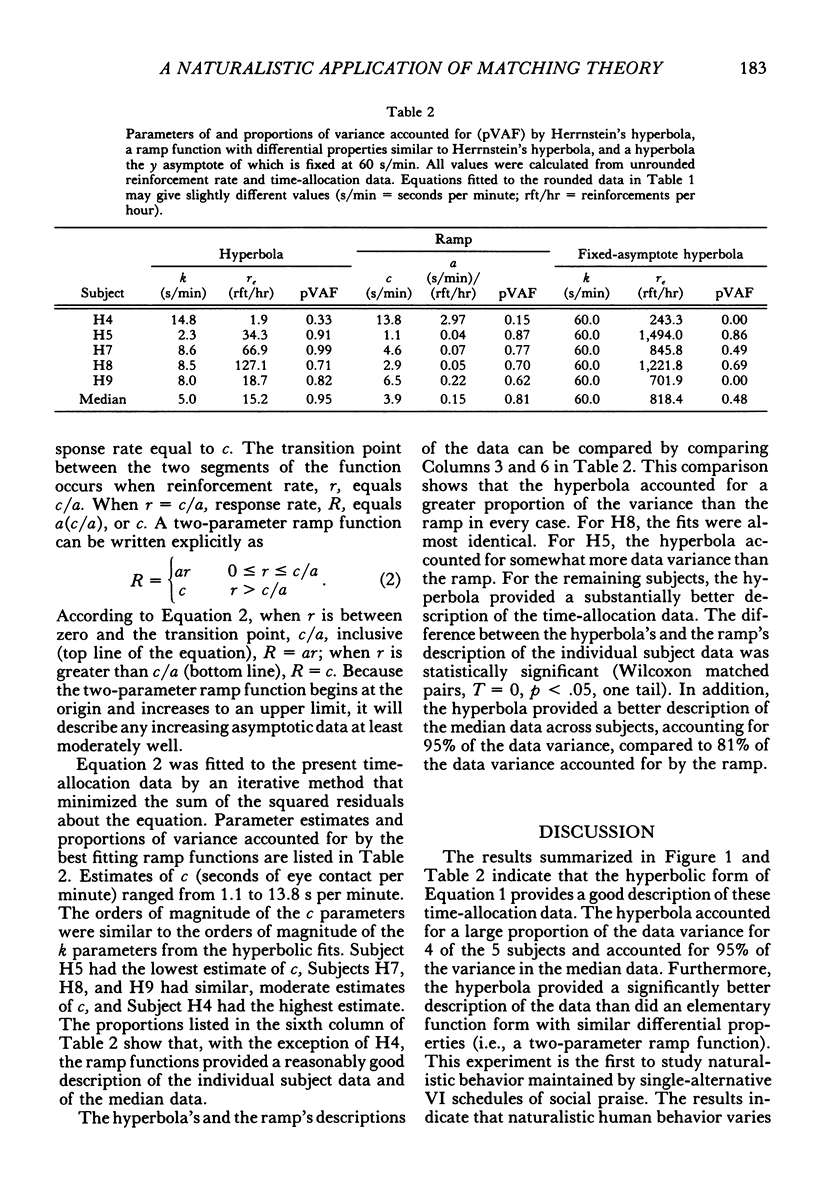
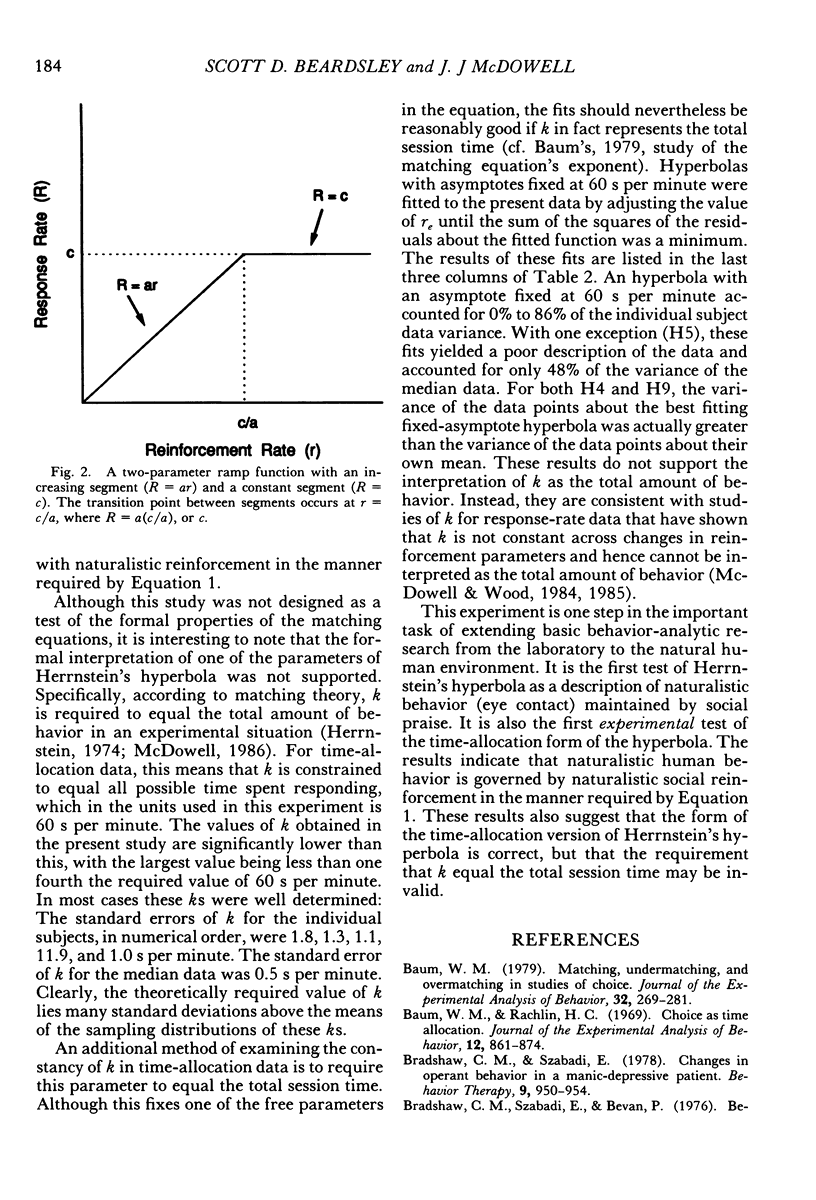
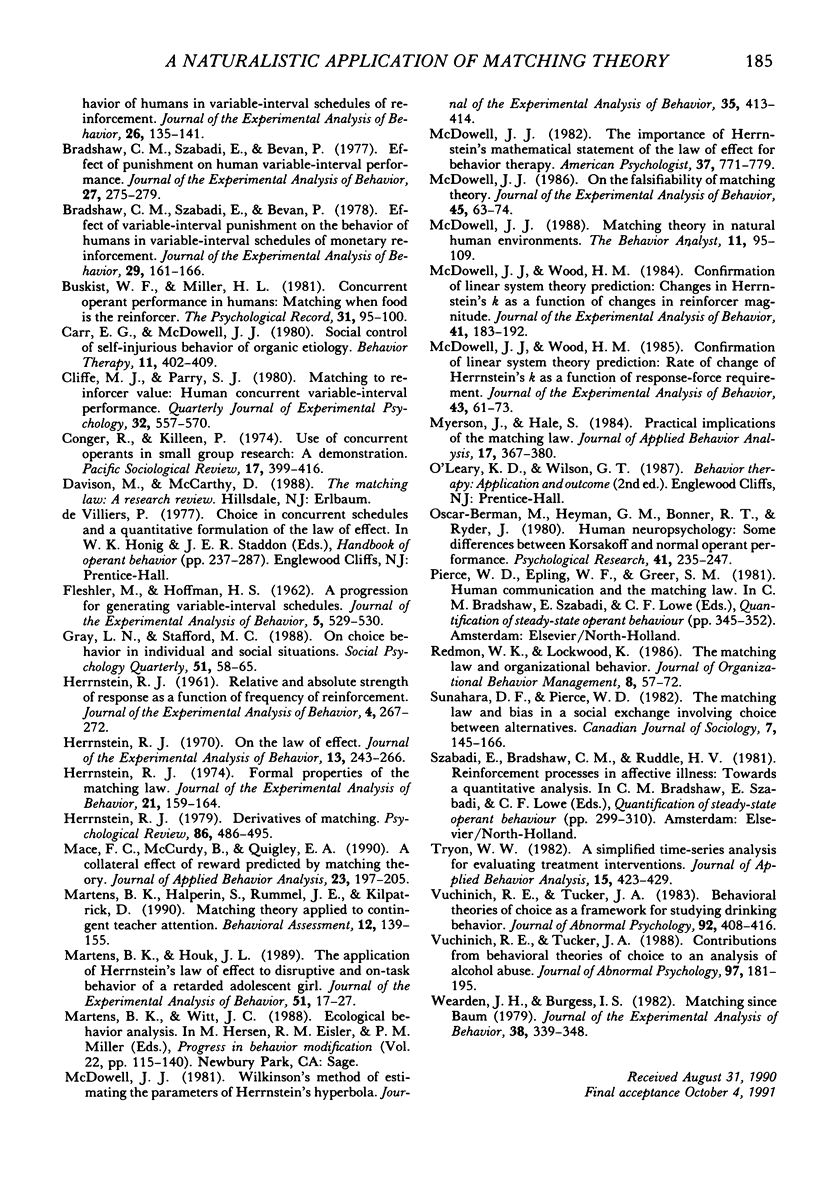
Selected References
These references are in PubMed. This may not be the complete list of references from this article.
- Baum W. M. Matching, undermatching, and overmatching in studies of choice. J Exp Anal Behav. 1979 Sep;32(2):269–281. doi: 10.1901/jeab.1979.32-269. [DOI] [PMC free article] [PubMed] [Google Scholar]
- Baum W. M., Rachlin H. C. Choice as time allocation. J Exp Anal Behav. 1969 Nov;12(6):861–874. doi: 10.1901/jeab.1969.12-861. [DOI] [PMC free article] [PubMed] [Google Scholar]
- Bradshaw C. M., Szabadi E., Bevan P. Behavior of humans in variable-interval schedules of reinforcement. J Exp Anal Behav. 1976 Sep;26(2):135–141. doi: 10.1901/jeab.1976.26-135. [DOI] [PMC free article] [PubMed] [Google Scholar]
- Bradshaw C. M., Szabadi E., Bevan P. Effect of punishment on human variable-interval performance. J Exp Anal Behav. 1977 Mar;27(2):275–279. doi: 10.1901/jeab.1977.27-275. [DOI] [PMC free article] [PubMed] [Google Scholar]
- Bradshaw C. M., Szabadi E., Bevan P. Effect of variable-interval punishment on the behavior of humans in variable-interval schedules of monetary reinforcement. J Exp Anal Behav. 1978 Mar;29(2):161–166. doi: 10.1901/jeab.1978.29-161. [DOI] [PMC free article] [PubMed] [Google Scholar]
- Cliffe M. J., Parry S. J. Matching to reinforcer value: human concurrent variable-interval performance. Q J Exp Psychol. 1980 Nov;32(4):557–570. doi: 10.1080/14640748008401845. [DOI] [PubMed] [Google Scholar]
- FLESHLER M., HOFFMAN H. S. A progression for generating variable-interval schedules. J Exp Anal Behav. 1962 Oct;5:529–530. doi: 10.1901/jeab.1962.5-529. [DOI] [PMC free article] [PubMed] [Google Scholar]
- HERRNSTEIN R. J. Relative and absolute strength of response as a function of frequency of reinforcement. J Exp Anal Behav. 1961 Jul;4:267–272. doi: 10.1901/jeab.1961.4-267. [DOI] [PMC free article] [PubMed] [Google Scholar]
- Herrnstein R. J. Formal properties of the matching law. J Exp Anal Behav. 1974 Jan;21(1):159–164. doi: 10.1901/jeab.1974.21-159. [DOI] [PMC free article] [PubMed] [Google Scholar]
- Herrnstein R. J. On the law of effect. J Exp Anal Behav. 1970 Mar;13(2):243–266. doi: 10.1901/jeab.1970.13-243. [DOI] [PMC free article] [PubMed] [Google Scholar]
- Mace F. C., McCurdy B., Quigley E. A. A collateral effect of reward predicted by matching theory. J Appl Behav Anal. 1990 Summer;23(2):197–205. doi: 10.1901/jaba.1990.23-197. [DOI] [PMC free article] [PubMed] [Google Scholar]
- Martens B. K., Houk J. L. The application of Herrnstein's law of effect to disruptive and on-task behavior of a retarded adolescent girl. J Exp Anal Behav. 1989 Jan;51(1):17–27. doi: 10.1901/jeab.1989.51-17. [DOI] [PMC free article] [PubMed] [Google Scholar]
- McDowell J. J. On the falsifiability of matching theory. J Exp Anal Behav. 1986 Jan;45(1):63–74. doi: 10.1901/jeab.1986.45-63. [DOI] [PMC free article] [PubMed] [Google Scholar]
- McDowell J. J. The importance of Herrnstein's mathematical statement of the law of effect for behavior therapy. Am Psychol. 1982 Jul;37(7):771–779. doi: 10.1037//0003-066x.37.7.771. [DOI] [PubMed] [Google Scholar]
- McDowell J. J. Wilkinson's method of estimating the parameters of Herrnstein's hyperbola. J Exp Anal Behav. 1981 May;35(3):413–414. doi: 10.1901/jeab.1981.35-413. [DOI] [PMC free article] [PubMed] [Google Scholar]
- McDowell J. J., Wood H. M. Confirmation of linear system theory prediction: Changes in Herrnstein's k as a function of changes in reinforcer magnitude. J Exp Anal Behav. 1984 Mar;41(2):183–192. doi: 10.1901/jeab.1984.41-183. [DOI] [PMC free article] [PubMed] [Google Scholar]
- McDowell J. J., Wood H. M. Confirmation of linear system theory prediction: Rate of change of Herrnstein's kappa as a function of response-force requirement. J Exp Anal Behav. 1985 Jan;43(1):61–73. doi: 10.1901/jeab.1985.43-61. [DOI] [PMC free article] [PubMed] [Google Scholar]
- Myerson J., Hale S. Practical implications of the matching law. J Appl Behav Anal. 1984 Fall;17(3):367–380. doi: 10.1901/jaba.1984.17-367. [DOI] [PMC free article] [PubMed] [Google Scholar]
- Oscar-Berman M., Heyman G. M., Bonner R. T., Ryder J. Human neuropsychology: some differences between Korsakoff and normal operant performance. Psychol Res. 1980;41(2-3):235–247. doi: 10.1007/BF00308659. [DOI] [PubMed] [Google Scholar]
- Tryon W. W. A simplified time-series analysis for evaluating treatment interventions. J Appl Behav Anal. 1982 Fall;15(3):423–429. doi: 10.1901/jaba.1982.15-423. [DOI] [PMC free article] [PubMed] [Google Scholar]
- Vuchinich R. E., Tucker J. A. Behavioral theories of choice as a framework for studying drinking behavior. J Abnorm Psychol. 1983 Nov;92(4):408–416. doi: 10.1037//0021-843x.92.4.408. [DOI] [PubMed] [Google Scholar]
- Vuchinich R. E., Tucker J. A. Contributions from behavioral theories of choice to an analysis of alcohol abuse. J Abnorm Psychol. 1988 May;97(2):181–195. doi: 10.1037//0021-843x.97.2.181. [DOI] [PubMed] [Google Scholar]
- Wearden J. H., Burgess I. S. Matching since Baum (1979). J Exp Anal Behav. 1982 Nov;38(3):339–348. doi: 10.1901/jeab.1982.38-339. [DOI] [PMC free article] [PubMed] [Google Scholar]


